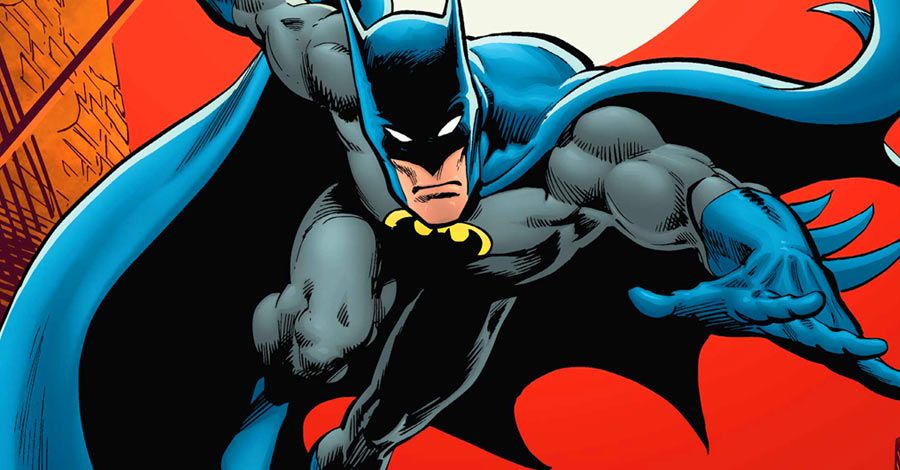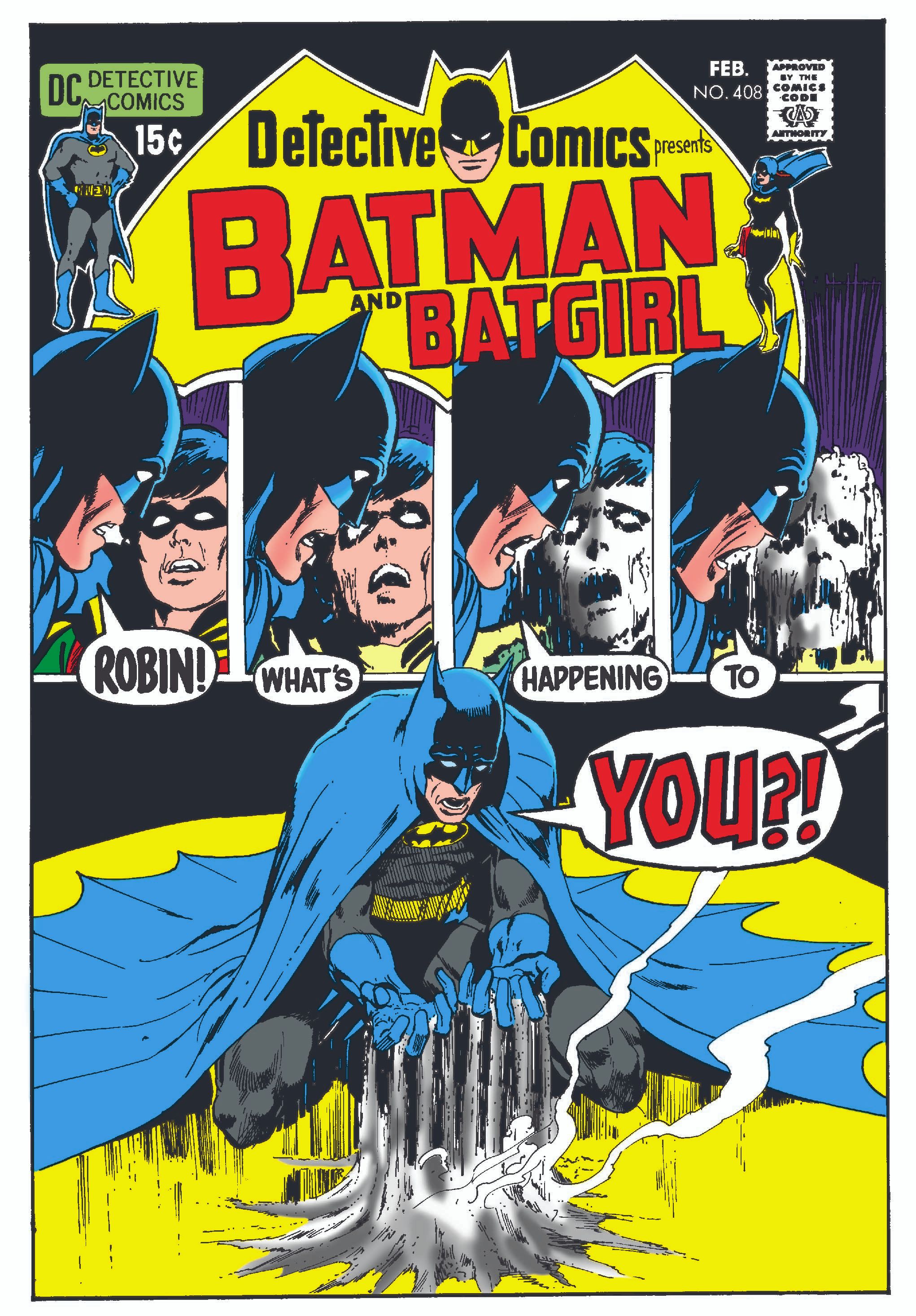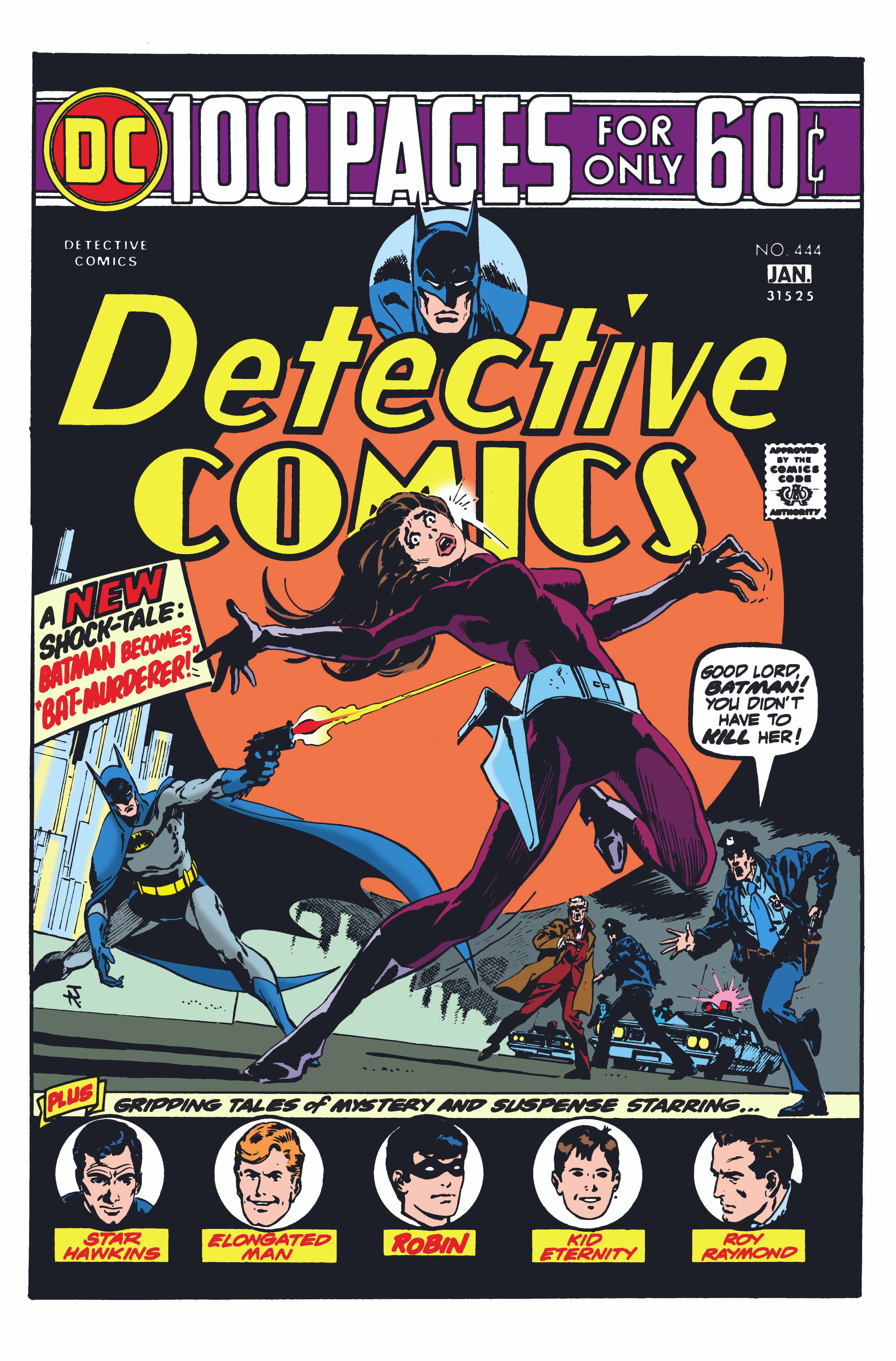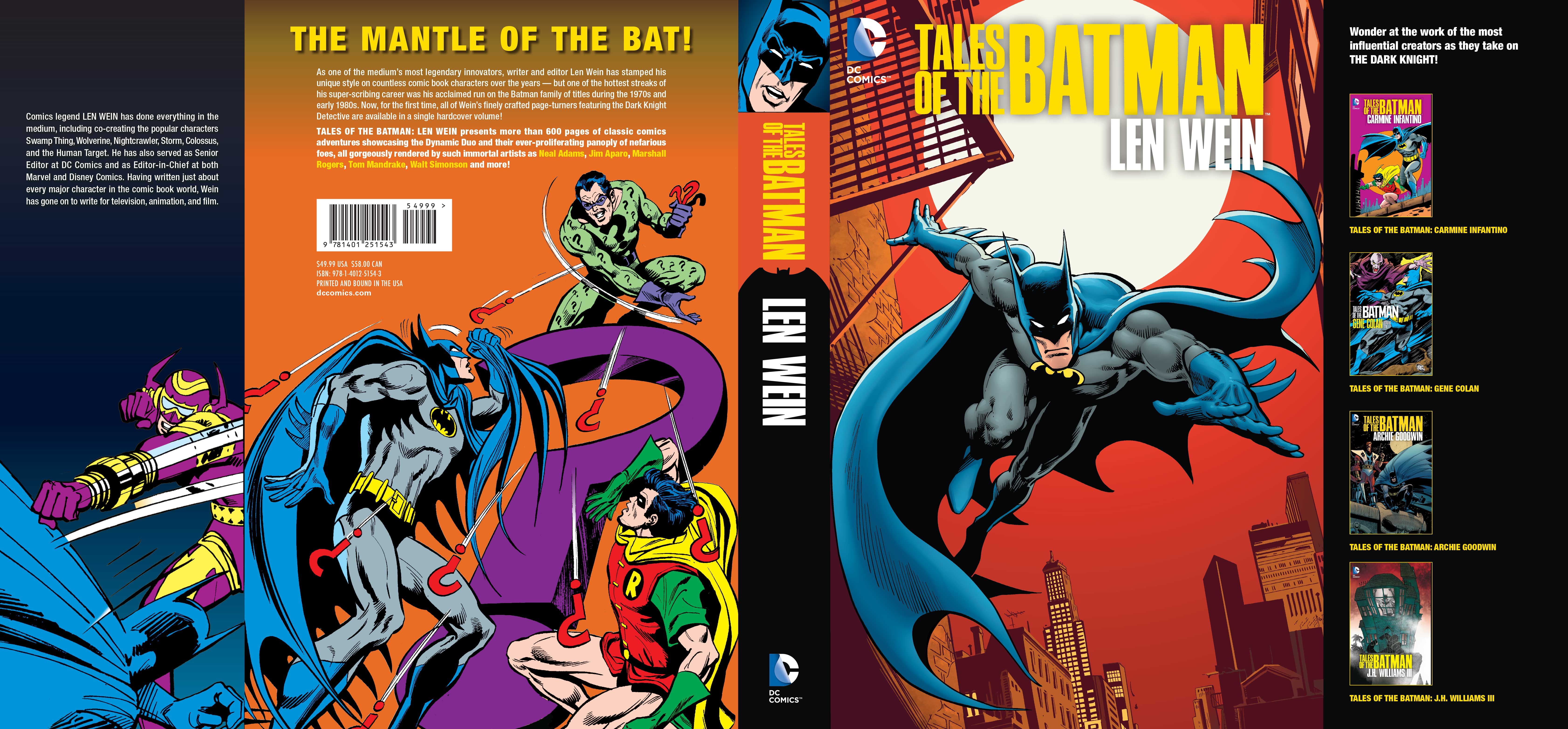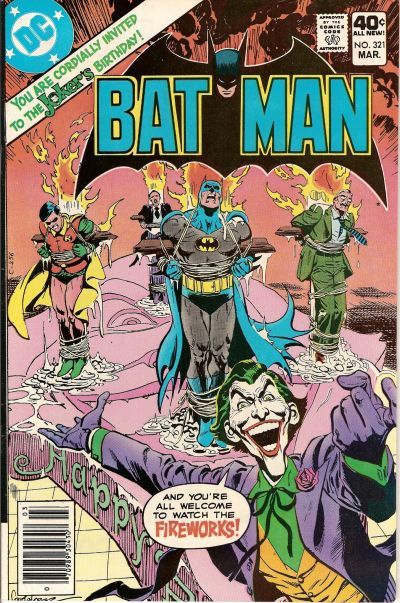Over a storied comic book career that spans back to the late 1960s, writer and editor Len Wein has enjoyed many landmark achievements including co-creating Marvel's Wolverine and DC Comics' Swamp Thing, as well as bringing Alan Moore to American comics. But very early on he had his eye on a big prize: writing the adventures of his earliest childhood superhero, Batman.
Finally becoming a writer for the Dark Knight in the 1970s, he penned stories during a crucial time in the hero's development. Transitioning away from the gadget-friendly detective of the comics and the straight-faced camp crusader of the ubiquitous TV series, Wein built out the dark, pulpy, noir-ish sensibility that became the character's hallmark, layering in Marvel-style continuity and a canonistic approach to the Bat-mythos. The writer introduced new characters and elements and redefined long-standing relationships that would become enduring staples for decades. Later serving as he editor of the Batman line, he also paved the way for subsequent creators to push the character to even grittier, moodier extremes.
Along the way, Wein's stories were illustrated by a Who's Who of many of the most significant and influential Batman artists in the character's history, including greats like Neal Adams, Marshall Rogers, Jim Aparo, Walt Simonson, Don Newton, Dick Giordano, Jose Luis Garcia-Lopez, Irv Novick and John Byrne.
In December the entirety of the comic legend's Batman writing (to date) was collected and released in the 640-page hardcover volume "Tales of the Batman: Len Wein," and to mark the occasion Wein joined Comic Book Resources for a fond look back at the era in which he made a significant mark on the Dark Knight's development.
CBR News: How eager were you to get a chance to get your hands on the character of Batman, and what were the circumstances that you were able to get the gig for the very first time, back in 1971?
Len Wein: "The House of the Haunted Batman"? That particular story is a weird set of circumstances. In terms of how anxious was I to get any Batman gig, I couldn't be more anxious for any character. The two first stories I remember reading as a kid were both Batman stories, so that's what kind of started my interest in comics. So I always wanted to write the Batman. That's one of the ways DC got me back from Marvel. In fact, when I went back to DC after my Marvel run, they offered me The Batman to write on a regular basis.
But the first story was very weird. Marv Wolfman and I were just starting out in many ways at that point, and we came up a Batman story which we pitched to Julie Schwartz, who was editing the book. And Julie said, "Nah, doesn't do anything much for me," and passed on it. And we went back to the DC bullpen, forlorn as any newcomer kid would be. We were just chatting with Neal Adams - he used to work out of the bullpen most of the time back then - and we told him our story and Neal said, "That sounds like a great story." And we said, "Yeah, we think so, too!" So Neal says, "Why don't you guys write up a script, and I'll draw it. Then we'll give it to Julie and see what he thinks about it when it's illustrated."
And we did exactly that - we took I don't remember how many months, but Neal drew the story and then we brought it into Julie essentially a fait accompli. He was not a happy man. Initially, he says, "Don't ever do that again!" And Neal said, "But you're going to buy the story still right?" He says, "Yeah, of course, I'm going to buy the story, dammit." And that's how we got our first Batman story published.
When you came back a few years later it was a time of really interesting change for the character. He'd already had that initial transformation back to a darker, moodier character, and then writers like yourself, Archie Goodwin and Denny O'Neil were really doing some interesting stuff to build that out around the time you came back. Was there a big master plan, or did everybody's vision for the character just sort of go in that direction?
I think it didn't start out as everybody's vision for the character. I believe it was originally Denny and Neal's vision of going back to doing "The Batman" as opposed to simply "Batman." And once they did what they did everyone else said, "That's fantastic!" And so everyone went to follow that model. It was a better character to write. It was much more exciting to write those kinds of more adult Batman stories than Batman vs. the Purple Monsters from Planet X, which had been a lot of what Jack Schiff had been doing when he was editing the books.
What was the element that you were hoping to bring yourself, the thing that you were really excited to say "This is going to be my contribution to The Batman?"
I never said that or thought that kind of thing. Things evolve as they evolve. I was just happy to have a chance to add my voice to the Batman character.
You got to do one of the earliest kind of extended stories that DC did, with the multipart "Bat-Murderer" storyline in "Detective Comics." How easy or hard was it to convince them to do that, and what was the thrill of bringing a little bit of a Marvel -style storytelling approach to DC characters at that point in time?
That's exactly it. I mean, I had learned a great deal while working at Marvel. The companies had essentially different storytelling styles in the earlier days, but as folks like me and Marv and Archie, the others you mention, kind of went back and forth. The two companies' storytelling styles got homogenized a little bit, and by the time I did the "Bat-Murderer" series it didn't seem out of any realm of possibilities to do an extended story. You'll note that every one of those stories starts with a little notation that the story takes place after the other current stories, so you could do a one story over a five-issue arc, as we did, without having to worry about it crossing back and forth with what other Bat-books there were at the time.
I look at these pages in the book and I see you working with artists who would become known as some of the greatest Batman artists of all time throughout each of your tenures on the character. Neal Adams, Marshall Rogers, Jim Aparo, Walt Simonson, Dick Giordano - we didn't know it at the moment, but what was it like to work with these emerging icons, the guys who were really setting a visual template for Batman that would be followed for decades to come?
I worked with all of them, one way or another. You're talking about icons: when I started working with Walter, I wrote the first story he ever drew for DC, so he wasn't that icon yet. He became one later on as he redeveloped his style. It was just fun - many of them were friends. I worked with Jim as editor and as writer on a number of other things as well, and I always loved working with Jim Aparo. I think he is one of the unsung heroes of the business. I don't think he gets anywhere near enough credit for the quality of his work, which was astonishing. Again, Neal was a friend. Walter was a friend. Marshall was somebody I would occasionally have lunch with. I knew everybody, so it was not like "Oh my god, look at these icons!" It's like "These are the guys to go out to lunch with."
Was there an element of the stories you were writing for Batman that turned out to be the most fun part of it for you?
Yeah, Actually, the one I think I most enjoyed was bringing Bruce Wayne back into the series. By the time I took over the regular ongoing Batman book, Bruce had sort of become a tertiary character. And I thought it would be interesting to make Bruce as important a player as The Batman was in the books. He is the other half of the character. And so I brought in Lucius [Fox] in the very first issue I wrote as my regular run just because I was sitting around thinking about Wayne Enterprises and Bruce and going, "All right, here's a guy who spends 23-and-a-half hours a day flying around the city in a bat-suit, and he runs a multi-billion-dollar corporation. There's got to be some guy on the ground running the business for him while he's out flapping around the city." And so I came up with Lucius Fox. But it also gave me the chance to bring in Selena and make her a semi-regular character, to have a relationship for the first time that was real between the two of them. That was the part I probably enjoyed the most, I think.
That was pretty groundbreaking, what you did with Catwoman in particular. How was the reception at the time that you were doing it?
Good - very good. I never really worried about the reception my stories get. I learned early on that if you cater to your audience, you're making a terrible mistake. [Laughs]
Speaking of mistakes, was there any path that you started going down while you were working on Batman that you were like "Nope, this isn't working. This idea might have sounded good on paper, but I'm not feeling it."
No, I generally am confident in what I do. The only time I ever changed the storyline was because of reader response to something I was doing relatively early in my "Thor" run over at Marvel, and I discovered that when I catered to my audience I made a terrible mistake, so I never did that again.
As you mentioned, you brought in the character of Lucius Fox. Obviously you've created plenty of comic book characters that have had incredible popularity and longevity, but to contribute a character to the Batman mythology that has grown and flourished over the years like it has - what has that meant to you?
Oh, a great deal. When the movies started I was told that Lucius was going to be in the [Christopher] Nolan trilogy. And one day Paul Levitz called up and said, 'Well, we got an actor to play Lucius." I said, "Oh, great, who?" He said, "Morgan Freeman." And my jaw hit the ground. I stumbled back and I said, "You-you-you couldn't find a good actor?" [Laughs] I was just amazed. I met him at the premiere of the first film - absolutely charming and wonderful guy! So I've been very lucky. So I mean, overall, the actors who portray my characters - I've had Oscar winners. I've had all kinds of people. I'm very lucky with the choices made.
Tell me about the experience of the mini-series "The Untold Legend of the Batman," which was also pretty trailblazing at the time for DC. Tell me how that came about and the experience working on it.
Well, I don't remember exactly how it came about. I was glad to be offered the assignment, I think, because I always wanted to clarify a number of things in the Batman mythos that were contradictions. One of the things I had wanted to clarify that had never really been clarified before was, "Okay, so you're coming home from the movies one night and your parents are murdered. And you decide that you're going to avenge their deaths." In the real world you decide, "Okay, I'm going to become a district attorney. I'm going to become a cop. I'm going to become some kind of law enforcement officer to compensate for whatever failures allowed my parents to be killed." You really don't sit down and go, "You know when I grow up, I'm going to put on a bat-suit and swing around the city to fight crime." So I wanted to explain why he became the Batman as opposed to becoming a law officer, some kind of authority.
It came down to a line I had heard years ago in the old ["Mod Squad"] TV show back when I was a kid. There was an episode titled "Is It Justice? No, It's the Law," which I thought was an amazing sentence. Matter of fact, I used it in the storyline, because that was the difference I realized: he wasn't interested in the law, he was interested in justice. So he avoided the law, and I actually got a chance to make a point of that, and I was very happy with it.
Tell me what your experience writing for Batman informed you when you took over editing Batman. What was the sensibility you were hoping to impose once you became his caretaker as an editor?
Well, I didn't hope to impose any. One of the very first things I was told when I first became an editor on anything was that I have a very strong writing style, and if my writers come out sounding like me, then I'm doing my job wrong. My job is to bring out the best in the people that work for me and not impose my own whatever over their work. I want them to do the best work they can. So I never really imposed anything. I said, "Give me the best stories you're capable of," writing-wise, and art-wise.
This question falls into the territory of "Which child is your favorite?" but is there a story among the ones we see collected in the book that's especially dear to you? One that you really look back on quite fondly?
Well, there's two of them, actually. One is "Dreadful Birthday, Dear Joker," which I did with Walter, which was great fun. No matter how many Joker stories I wrote in my career, I never wrote enough to suit me. I always love writing the Joker because he's a monster. The one that you can never really beat because his attitude has always been "If I kill you, I win. If you kill me, I win." That's something you can't really beat. So I love that story. And I think the story - I haven't got the book in front of me at the moment - "Haven" was a one-shot I did, filling in for Gerry Conway when he was writing the book, which I really liked.
And you have at least one more Batman-related assignment ahead, correct?
I'm writing a two-part "Detective Comics" story in "Convergence," so it's not exactly Batman, but it's really the Earth-2 Robin and Huntress. It's in the Bat-World, certainly.
At this point, what do you find you still love about the Batman character? What's still gets you excited when you read a story?
It's because you can still be a Batman. Anybody can grow up to be the Batman. I always used to say, "God forbid, when you're a kid, your parents get murdered, and you grow up to be the Batman." You can never grow up to be Superman as your planet explodes and your father is the best scientist on the planet. So Batman is the more accessible character, I've always believed. I love Superman, but I've always thought Batman was more accessible.
The first issue of a contemporary Batman book that I ever picked up was your second regular issue of "Detective Comics" and the "Bat Murderer storyline with Jim Aparo, and it was my first real taste of Bat-crack, so thank you for that.
You're very welcome, I know exactly how you feel.
What's it kind of know that you had a hand in perpetuating the character's longevity and introducing him to successive generations like me?
It's a little humbling. But I love doing it, so it's fine. I hope to be involved with the character for years to come.
"Tales of the Batman: Len Wein" is on sale now from DC Comics.

